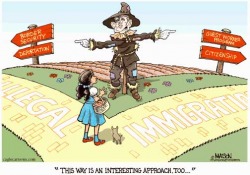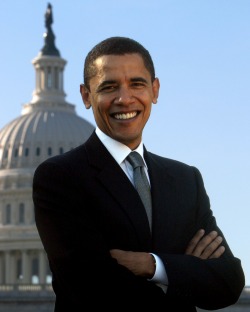The Student Forum for Immigration Reform
Background: The Immigration Debate

It's hard to deny that illegal immigration is one of the many problems currently facing the United States. How to curb the problem, however, has been the subject of heated debate in the U.S. for years. Should we increase the number of patrols along our international borders? How about building a fence along the entire length of the U.S.-Mexico border? Or should we streamline the process by which immigrants can enter the country legally, and allow for greater legal immigration into the country?
Solution

Given the current circumstances the country finds itself facing, I believe that the U.S. government should increase the number of people allowed to enter the country legally as a means of curbing illegal immigration into the country, particularly for economic reasons.
Economics

A common myth perpetuated by those opposed to expanded immigration is that illegal immigrants create a large burden on government aid agencies, and are a fiscal drain. In reality, illegal immigrants are often revenue generators, particularly in states along the U.S.-Mexico border. According to Carole Keeton Strayhorn, former Comptroller of the state of Texas, illegal immigrants in that state produced $1.58 Billion in state revenues in fiscal 2005, while receiving just $1.16 Billion in state services (Strayhorn 3). Do the math, and that's a net gain of $420 Million. Other border states, such as Arizona, have also benefited economically from illegal immigration. According to Luis Alberto Urrea, whose book, "The Devil's Highway", chronicling the journey of twenty-six men trying to cross the border illegally into the U.S. from Mexico, was nominated for a Pulitzer Prize for General Nonfiction, Remittances from Arizona's Mexican immigrants back to Mexico totaled $468 Million in 2003, which generated $57 Million for banks and financial institutions in that state (Urrea 218, 219). Urrea also noted a study released by UCLA's North American Integration and Development center that found that "undocumented immigrants" contributed "at least $300 Billion per year to the U.S. Gross Domestic Product," or GDP (Urrea 217). This illustrates that the economic impacts of illegal immigration are felt nationwide.
Plans for the Future

According to the platform posted on his website, president-elect Barack Obama's immigration policy involves increasing the number of people allowed to enter the U.S. legally as a way to keep immigrant families together and "meet demand for jobs that employers can't fill" ("Immigration", par. 2). President-elect Obama also favors a system of amnesty in which undocumented immigrants "in good standing" would be made to pay a fine, learn English, and "go to the back of the line for the opportunity to become citizens" ("Immigration", par. 3).
Get Involved
Here are some websites of advocacy groups which favor expansion of immigration and protecting immigrant rights.
www.icirr.org-Illinois Coalition for Immigrant and Refugee Rights
www.immigrationforum.org-National Immigration Forum
www.nnirr.org-National Network for Immigrant and Regufee Rights
www.splcenter.org/intel/immigrant.jsp-Southern Poverty Law Center
Works Cited
"Immigration". Barackobama.com. 5 January 2009. 5 January 2009. <http://www.barackobama.com/issues/immigration>
State of Texas. Office of the Comptroller. Undocumented Immigrants in Texas: A Financial Analysis of the Impact to the State Budget and Economy. By CaroleKeeton Strayhorn. December 2006. 19 October 2008.<http://www.window.state. tx.us /specialrpt/ undocumented/undocumented.pdf>.
Urea, Luis Alberto. The Devil's Highway. New York: Back Bay Books, 2004.
